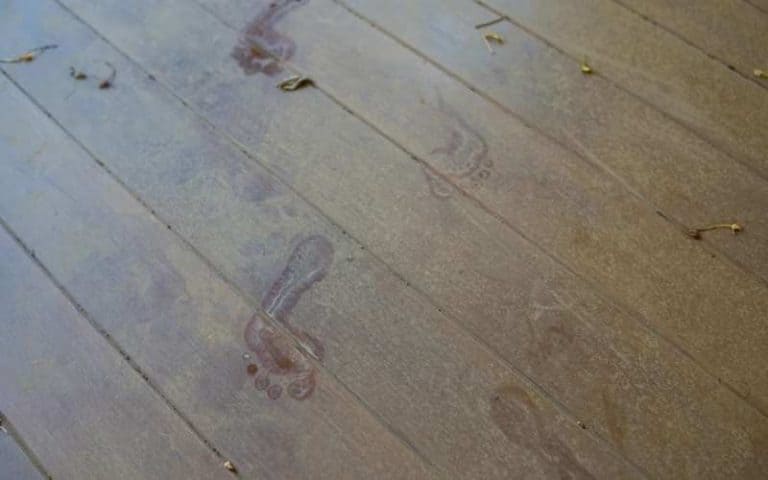Picture this: you’ve just moved into a beautiful new home. The sun streams through the windows, highlighting the gleaming hardwood floors that stretch across the entire living area. You can’t wait to feel the warm wood beneath your bare feet. But as you take your first steps, a sharp pain shoots through your arch. Suddenly, that dream home feels a little less dreamy.

Image: floorcarekits.com
Many people experience foot pain on hard surfaces like hardwood floors. It’s not just about the hardness itself, but a combination of factors that can lead to discomfort. While some people seem to walk on hardwood floors with no problem, others find it can lead to a variety of foot ailments. This article will explore the reasons why hardwood floors might cause foot pain, and offer tips on how to mitigate these issues.
Hardwood Flooring and Foot Pain: The Science
Hardwood floors offer a variety of benefits, including durability, elegance, and increased property value. But even with all these positives, they can pose a challenge to your feet. Here’s a breakdown of why:
Firstly, hardwood floors lack the shock absorption that carpeted floors provide. When you step on a carpeted floor, the carpet cushions your foot, absorbing some of the impact. This cushion helps to minimize stress on the joints, muscles, and ligaments in your feet and legs. Hardwood floors, however, offer no such cushion. Every step sends a direct shock wave up your leg, which can contribute to foot pain and fatigue.
Another factor is the lack of give. Unlike soft surfaces like carpets, hardwood floors are rigid and inflexible. This rigidity can increase the pressure on your feet during walking, leading to discomfort, particularly in areas like the arches, heels, or balls of the feet.
Furthermore, the lack of texture on hardwood floors can contribute to foot pain. Carpet fibers provide a slight friction that helps with balance and stability. Hardwood floors, however, offer a smooth surface that can make it easier to slip or lose your balance, particularly if you are wearing socks or bare feet. This can cause overcompensation and strain on the feet and ankles.
Factors Affecting Foot Pain on Hardwood Floors
Even if you have no previous foot problems, stepping onto hardwood floors can still lead to pain. While the lack of cushioning and texture are key factors, other variables can influence your experience:
Existing Foot Conditions: If you have conditions like flat feet, plantar fasciitis, metatarsalgia, or high arches, hardwood floors can exacerbate your pain.
Body Weight: If you are overweight or obese, your feet bear more weight, increasing the strain on your joints and muscles, making hardwood floors more painful.
Amount of Walking: While a few steps on the hardwood floor might be fine, extensive walking on these surfaces can trigger significant pain. This is especially true if you are standing for long periods.
Addressing Foot Pain on Hardwood Floors
So, there’s the crux of the problem: hardwood floors can indeed cause foot pain, especially if you have existing foot issues. But, the good news is, you can take steps to mitigate the discomfort and continue to enjoy your beautiful floors. Let’s look at some practical tips.

Image: zy-precision.com
Tips and Expert Advice
Footwear
Your footwear plays a significant role in mitigating foot pain on hardwood floors. Invest in shoes that provide good arch support, cushioning, and shock absorption. Look for shoes with padded insoles, good arch support, and a flexible sole. Orthopedic shoes, walking shoes, or sneakers with good cushioning are excellent choices.
Insoles and Supports
Consider using insoles or arch supports in your shoes. These can provide additional cushioning and support, reducing the impact on your feet. You can find custom-made orthotics from a podiatrist or ready-made insoles at many shoe stores.
Rugs and Mats
Strategically placed rugs and mats can transform your hardwood floors into softer, more foot-friendly spaces. Use rugs in areas where you spend a significant amount of time, such as in front of the sofa or in the kitchen. Choose rugs with a soft pile or even plush carpets, offering excellent cushioning.
FAQ About Hardwood Floors and Foot Pain
Q: Are all hardwood floors created equal in terms of foot pain?
A: No, the type of wood and the finish can affect the hardness of the surface. Softer woods like pine are more forgiving than harder woods like oak. Polished or lacquered finishes can also contribute to slipperiness and lack of cushioning.
Q: Can I wear bare feet on hardwood floors?
A: Prolonged walking barefoot on hardwood floors is generally not recommended. This can lead to a buildup of stress and strain on your feet. However, if you have healthy feet, you may be able to tolerate it in short bursts with no ill effects.
Q: I have existing foot problems. What can I do?
A: If you have foot conditions, it’s essential to consult a podiatrist. They can offer personalized advice for managing your pain and recommend specific footwear or orthotics.
Do Hardwood Floors Make Your Feet Hurt
Conclusion
Hardwood floors can be a stunning addition to your home, but they can also contribute to foot pain, particularly for people with pre-existing foot conditions. Understanding the factors that cause this discomfort and implementing the right strategies, such as appropriate footwear, insoles, and rugs, can make your hardwood floors comfortable and enjoyable. Remember, your feet are the foundation of your well-being, so prioritize their comfort by taking steps to address potential pain points.
Do you have any experiences with hardwood floors and foot pain? Tell us about your story in the comments below!






